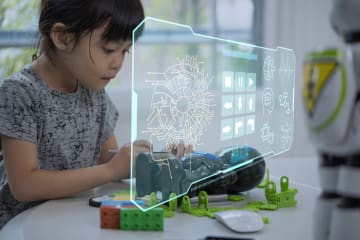AI and Computer Science: Career Options and the Path Forward

In recent years, artificial intelligence (AI) has been making waves in every field — from healthcare to finance, education to entertainment. As the technology advances, its integration into various sectors continues to grow, raising questions about its implications for the workforce. To better grasp these changes, it’s important to first understand that AI development involves creating and improving AI models and algorithms, while applied AI focuses on using those models to solve practical problems.
For anyone looking to explore AI, understanding its relationship with computer science (CS) is crucial, as AI is fundamentally rooted in this discipline. Whether you're interested in machine learning, data science or AI research, a degree in computer science can open numerous doors to a career you may find exciting.
In This Article:
- The Role of Artificial Intelligence in Computer Science
- Building a Career in AI and Computer Science
- AI Career Opportunities
- Will Computer Science Be Replaced By AI?
- The Future of AI Careers
The Role of Artificial Intelligence in Computer Science
Artificial intelligence refers to computer systems that can perform tasks usually done by human intelligence or use brute force to calculate all possible solutions to a problem by far superseding human analytical capabilities.1 These tasks include decision-making, perception, language processing and pattern recognition. As a key subfield of computer science, AI leverages core CS principles, such as algorithms, data structures and programming, to develop systems that can simulate human cognition. AI also encompasses various specialized areas, including machine learning, natural language processing (NLP) and computer vision, all of which rely on computer science fundamentals.1
Dr. Isac Artzi, associate professor in the College of Engineering and Technology at Grand Canyon University, explains, “AI is an extension of CS, with its core foundation rooted in linear algebra, such as vectors, matrices, linear transformations and statistics. These methods are translated into algorithms, a core component of CS and implemented through programming languages.”
Areas such as machine learning, natural language processing (NLP), robotics and computer vision are examples of AI technologies built upon computer science’s foundational principles. As AI evolves, the need for experienced professionals who have years of industry experience and understand both the theoretical and practical aspects of CS and AI continues to grow faster than average.2 This increasing complexity underscores the importance of a strong mathematical and programming foundation, which is essential for truly understanding and working in the field of AI.
Difference Between CS and AI
Computer science covers various topics, including algorithms, data structures, software engineering and systems design. It focuses on the design, optimization and development of computing systems. In contrast, AI adds complexity by aiming to replicate human cognitive functions, such as learning, reasoning and problem-solving through computational methods. While CS provides the foundational tools, AI pushes the boundaries of these tools to create systems capable of autonomous decision-making.
 Dr. Artzi highlights two distinct tracks in AI: "theory, which advances slowly and steadily and implementation, which drives revolutionary change." He continues to state that theoretical advancements focus on the mathematical foundations of intelligent behavior, while implementation involves applying these theories to create practical AI technologies.
Dr. Artzi highlights two distinct tracks in AI: "theory, which advances slowly and steadily and implementation, which drives revolutionary change." He continues to state that theoretical advancements focus on the mathematical foundations of intelligent behavior, while implementation involves applying these theories to create practical AI technologies.
“At GCU, we teach students both the theory behind AI and its practical applications,” noted Dr. Artzi.
While CS and AI are closely related, AI goes beyond traditional CS by tackling the challenge of mimicking human intelligence. It requires deep integration of mathematics, programming and domain-specific expertise.
Building a Career in AI and Computer Science
A strong foundation in key areas like programming, mathematics, algorithms and data analysis can help you build a career in AI and computer science. Focusing on relevant courses, gaining hands-on experience and staying informed on emerging technologies can help you prepare for this fast-evolving field.
To better utilize artificial intelligence in computer science, Dr. Artzi recommends focusing on improving these skills:
- Machine learning
- Bridging complex mathematical concepts with software applications
- Translating data-driven scenarios into a computational problem
- AI research
- Linear algebra
- Statistics
By mastering these skills, you'll be better prepared to pursue a career in AI and computer science, with the flexibility to adapt and grow as the field continues to evolve.
AI Career Opportunities
AI is revolutionizing industries and with it comes a variety of specialized career paths. These roles span multiple sectors, offering opportunities for those with a background in both AI and CS. “My students are at an exciting pivotal point in the evolution of humanity, contributing to advancements as transformative as the invention of the steam engine, electricity, flight and nuclear power reactors,” said Dr. Artzi.
These specialized roles play a key part in advancing artificial intelligence, offering unique opportunities for professionals with a background in AI. Exploring a career in these areas could be a valuable option if you have a specific interest in AI. Here’s a look at emerging roles in the AI industry:3,4
- Machine learning engineer
- Natural language processing (NLP) engineer
- Language model trainers
- Computer vision engineer
- AI ethicist
- AI product manager
- Prompt engineers
- API integration experts
Let’s take a closer look at some of the primary functions and work responsibilities within AI industries:
- Optimize ML scheduling systems and monitor performance
- Manage compute capacity for scalable AI operations
- Improve inference scalability and model capabilities
- Support ML system design and infrastructure
- Refine encoding and tokenization processes
- Develop and maintain model interaction APIs
- Evaluate and benchmark AI model performance
- Design and verify reinforcement learning algorithms
- Shape and monitor AI model behavior
- Boost performance and efficiency of AI systems
In addition to this scope of work, AI skills are needed in various industries, such as healthcare, finance, automotive and entertainment.5,6 As AI continues to expand its capabilities, professionals who can bridge the gap between technology, business and ethics will be key players in shaping the future of AI.
Will Computer Science Be Replaced by AI?
Dr. Artzi explains that while AI will play a significant role in automating many jobs across various industries, it is unlikely to fully replace computer science or programmers. He said, “In the next two to four years, AI may advance to the point where it can develop its own software, improving in ways we can't even imagine today.”
However, Dr. Artzi emphasizes that human involvement will remain essential. “AI may take on more tasks, but it’s up to us to ensure we maintain an edge over it by focusing on new careers that manage and guide AI.” This perspective highlights the ongoing need for human creativity and oversight in the development of AI.
For example, in Dr. Artzi's CST-320: Human-Computer Interaction and Communication course, students like Jack Utzerath and Hunter Jenkins developed a virtual reality gym as their end-of-semester project.7 The VR program uses an AI personal trainer to guide users through exercises and teach them about gym equipment, helping beginners build confidence and learn proper form.7 This project showcases how AI can enhance user experiences in educational and interactive environments within computer science.
Additionally, Dr. Artzi highlights recent GCU student projects that leveraged applied AI concepts, developed through hands-on internships, industry collaborations and innovative initiatives, such as:
- Machine learning translator converting COBOL code to Java
- Smart meeting cost estimator for Outlook and Teams
- Conversational agent extracting info from large software documentation
- Fall detection sensors for water pools
- Smart image analysis
- AI-driven learning paths for mental health counseling
“While AI may assist in programming, graduates must prove their creativity, innovation and problem-solving abilities to maintain the human edge in software development,” according to Dr. Artzi. For a deeper exploration of this topic, check out the blog post on whether AI will replace programmers.
The Future of AI Careers
The landscape of CS and AI is constantly evolving, with new roles and opportunities emerging as technology progresses. AI has already significantly impacted industries such as healthcare, automotive and entertainment, and we are only beginning to explore its full potential.8
The future of AI will require professionals who balance technical skills with creativity, ethical awareness and a deep understanding of human needs. A degree in computer science provides a solid foundation for those looking to pursue a career in this field that is growing faster than average.9
According to Dr. Artzi, “It’s important to note that AI programming is typically not an entry-level skill and may not be ideal for recent graduates, especially as AI tools like Lovable.ai are already generating a significant portion of software in large companies.” He continues to say, “AI could be writing up to 90% of all code within the next three to six months, according to the CEO of Anthropic, Dario Amodei, at a recent council on foreign relations event.”10 While that’s just a projection, it certainly speaks to the rapid pace at which AI is transforming industries — emphasizing the importance of students and new graduates continually reskilling to stay competitive in the evolving tech landscape.
Computer science programs can help build the critical thinking, problem-solving and coding expertise needed to grow into more advanced roles like AI programming, making them a strong first step on a continually evolving career path.
Explore AI and Tech Opportunities with a Degree from GCU
Dr. Pam Rowland, associate dean of technology in the College of Engineering and Technology, explains, “By working with GCU strategic employer initiatives and internships department, our college brings real companies and employers for students to make connections and find potential jobs.” GCU is passionate about ensuring students gain valuable industry experience and have opportunities to launch their careers after graduation.
A degree in AI and technology from the College of Engineering and Technology at GCU can help you open doors to a range of opportunities. If you enjoy innovation and contributing to change, this field offers the chance to explore limitless possibilities and contribute to meaningful advancements across industries. Learn more by exploring our computer science programs today.
1 Stryker, C. and Kavlakoglu, E. (2024). What Is AI? IBM. Retrieved Feb. 18, 2025.
2 U.S. Bureau of Labor Statistics. (2024, Aug. 29). Computer and Information Research Scientists – Job Outlook. Occupational Outlook Handbook. Retrieved April 9, 2025.
3 Pecan. (2024, May 7). Decoding Artificial Intelligence Job Titles. Retrieved April 8, 2025.
4 Magill, K. (2023, July 6). Jobs of the Future, Now Hiring: AI Job Titles and What They Do. Dataspace. Retrieved April 8, 2025.
5 U.S. Bureau of Labor Statistics. (2024, Aug. 29). Computer Systems Analyst. Occupational Outlook Handbook. Retrieved Feb. 25, 2025.
6 U.S. Bureau of Labor Statistics. (2024, Aug. 29). Information Security Analyst. Occupational Outlook Handbook. Retrieved Feb. 25, 2025.
7 Sweeten-Shults, L. (2023, Dec. 12). Virtual Reality Gym, Pirate Ship Projects a Treasure. GCU News. Retrieved Feb. 25, 2025.
8 Silicon Valley Innovation Center. (2024, May 23). Proliferation of AI Across Industries. Retrieved March 26, 2025.
9 COVID-19 has adversely affected the global economy and data from 2020 to 2023 may be atypical compared to prior years. Accordingly, data shown is effective September 2024, which can be found here: U.S. Bureau of Labor Statistics, Occupational Outlook Handbook, Information Security Analyst, retrieved Feb. 23, 2025.
10 Linkedin. (2025, March 19). Will AI Be Writing 90% of Code in Six Months? Retrieved April 9, 2025.
Approved and verified accurate by the assistant dean of the College of Engineering and Technology on April 9, 2025.
The views and opinions expressed in this article are those of the author’s and do not necessarily reflect the official policy or position of Grand Canyon University. Any sources cited were accurate as of the publish date.


